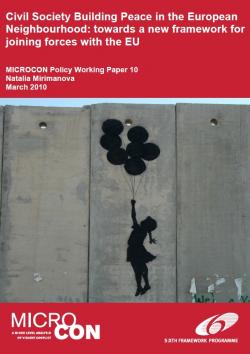Civil Society Building Peace in the European Neighbourhood: Towards a New Framework for Joining Forces with the EU
Within its own borders, the European Union (EU) is certainly a peace project. However, its external security and stability imperative does not make it a peacebuilding project in the neighbourhood and beyond by default. The official EU institutions have political and conceptual limitations that prevent them from meaningfully engaging with and addressing state formation conflicts. This paper addresses the disconnect between the European Union and the civil society operating in the field of peacebuilding at the level of theories of change underlying policies, strategies and activities with the aim of transforming and resolving conflicts. Theories of change are elicited from the reflections and experiences of CSOs and from the main documents that concern conflicts and peacebuilding in the European Neighbourhood. It proposes a new framework for the forecast and assessment of the impact of CSOs on peacebuilding, which can be considered by the EU institutions for building strategic partnerships with international and local civil society to enhance conflict transformation in the European Neighbourhood.
Paper produced in the context of the MICROCON project (Work Package 11, "Conflict in the European Neighbourhood"), funded by the EU's Seventh Framework Research Programme.
-
Details
Brighton, Institute of Development Studies at the University of Sussex, March 2010, 48 p. (MICROCON Policy Working Paper ; 10) -
ISBN/ISSN/DOI:
978-1-85864-921-8
Introduction
1. EU support for civil society and peacebuilding: do these universes cross?
2. Conflict resolution aspects of the European Neighbourhood Policy (ENP)
2.1 ENP Action Plans and EU conflict interventions: review
2.2 Deficiencies of the ENP Action Plans and EU conflict interventions
3. Theories of change in use by peacebuilding CSOs in the five state formation conflicts in the European Neighbourhood
3.1 Theories of change in use by the peacebuilding CSOs in the European Neighbourhood
3.2 Civil society capacity of peacebuilding CSOs in the implementation of their theories of change
4. Professional cooperation between the EU and civil society: towards a new framework for the CSO peacebuilding impact assessment
4.1 Peace as stability versus peace as change
4.2. Civil society as an institutional basis for peacebuilding
4.3 Components of the new framework
5. Conclusion
Annex I. List of interviews
Abbreviations
References
Topic
Tag
Related content
-
Ricerca27/01/2014
MICROCON - Conflicts in the European Neighbourhood
leggi tutto



